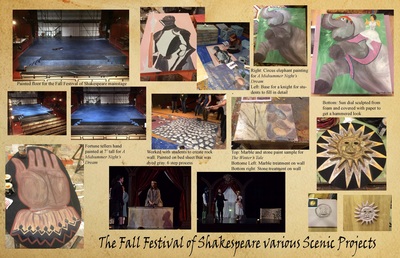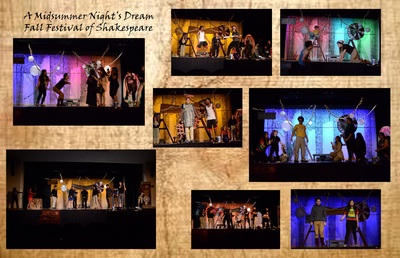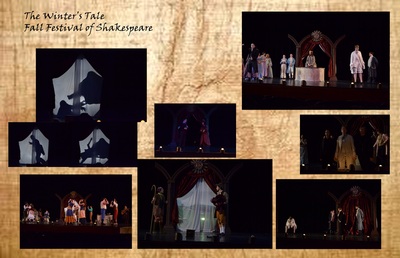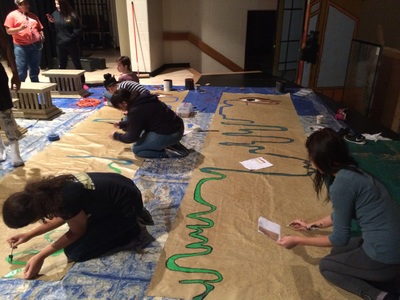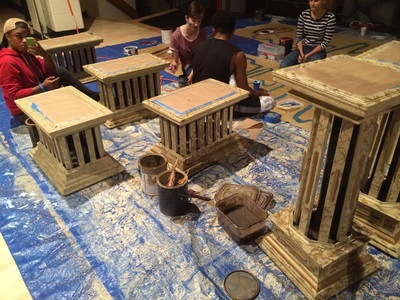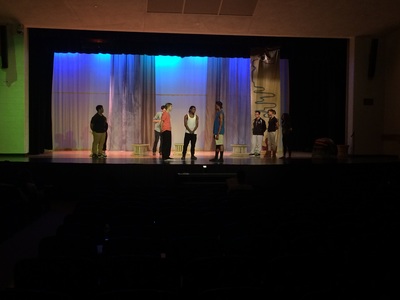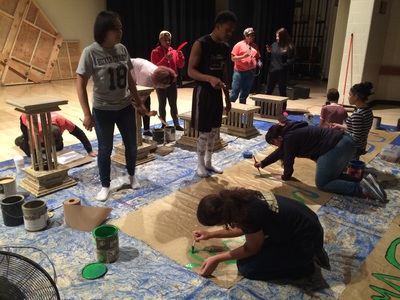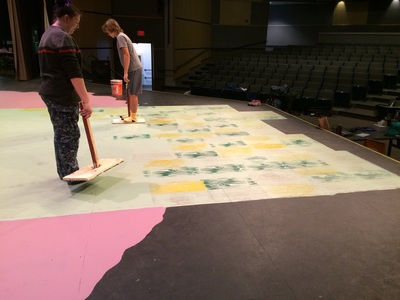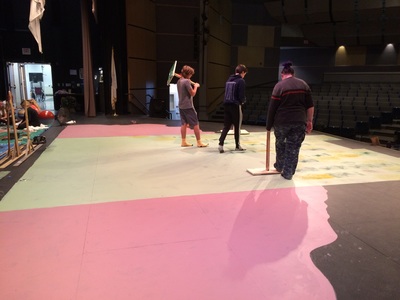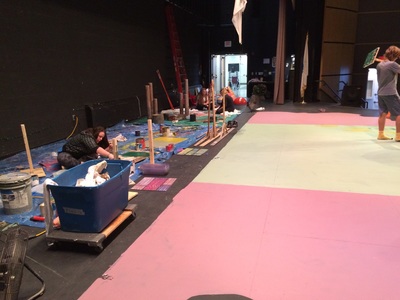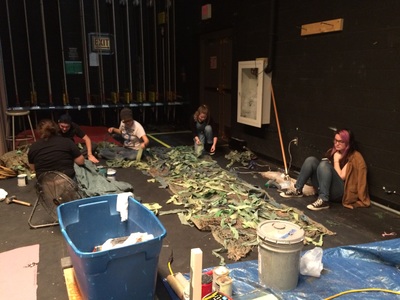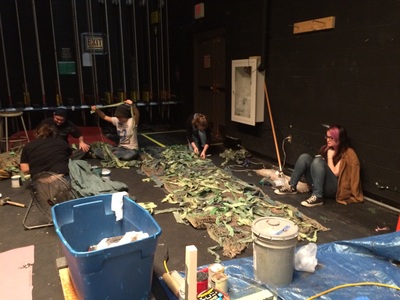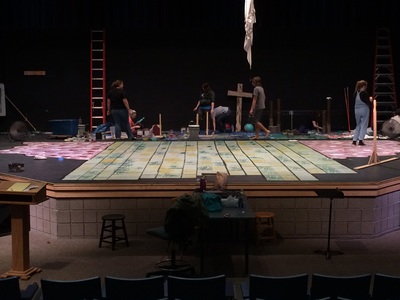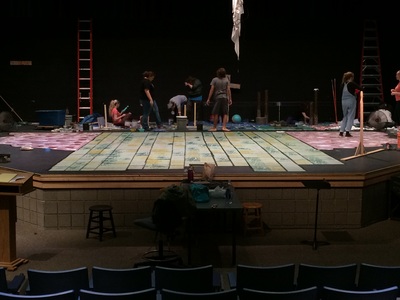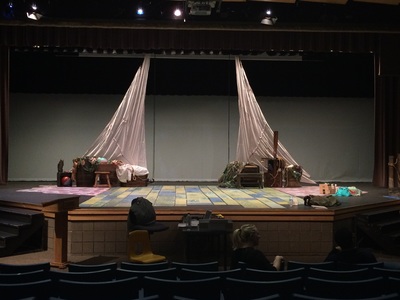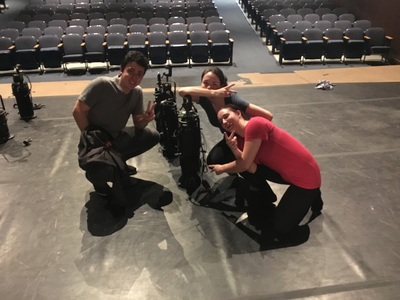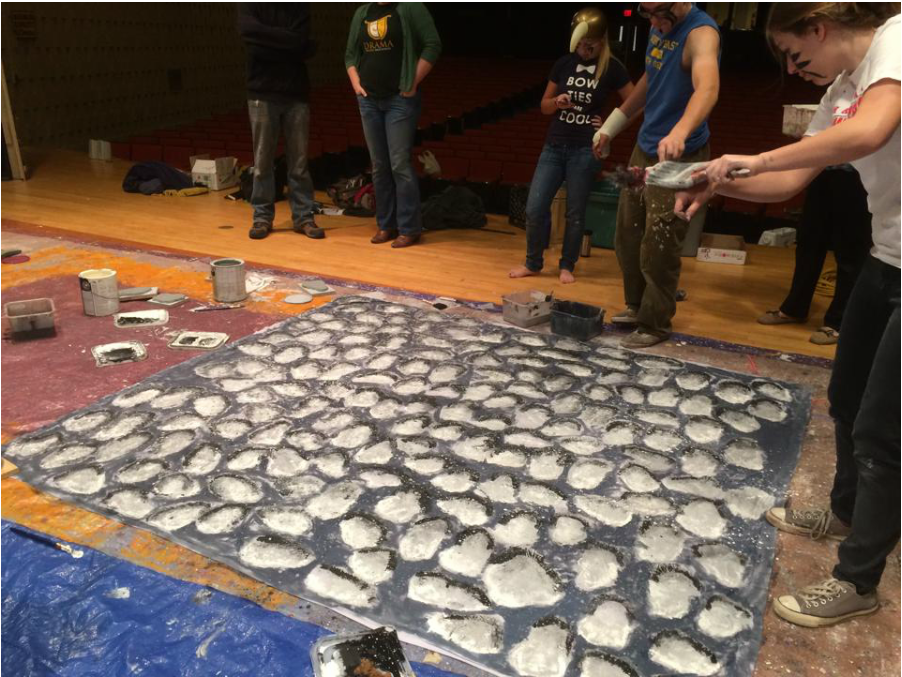Educator |
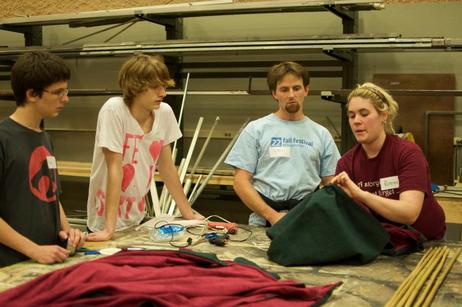
When I began my career, teaching was not in the forefront of my mind. I am pleased I have come to love sharing my knowledge and craft with people ranging from middle school to a university level. There is something quite special about being able to see an individual become excited about learning a new subject. I believe the purpose of education is to allow people the ability to explore what it is they want to do in life and, especially by the time they get to college, to hone their craft.
Theatre is a diverse area in which a student can learn many universal skills that are helpful in any industry. As a student, one of the things I remember most from my own college application process was the discussion of the broad impact of a theatre degree in other industries. The theatre helps students to learn public speaking, writing, strong leadership skills, how to work with varying personalities, and so much more. Since receiving my B.A. in Fine and Performing Arts from Massachusetts College of Liberal Arts, I have had many opportunities to work in varying theatre positions, as well as the opportunity to receive an M.F.A in Theater Design from The University of North Carolina at Greensboro. I want to give students an even better experience than I had as a student by building upon the knowledge and experience I gained through my professional work and graduate study. I want to see the new generations of theatrical professionals succeed after college.
In addition to mentoring students in a way that allows them to succeed before graduation, I want to be able to use my expertise in scenery, lighting, and scenic painting to teach them skills that will help them to achieve many great jobs and careers when they enter the real world. My training in these areas produced opportunities to paint murals, restore lighting in church naves, and work on projects for people’s homes. In theatre, I have procured jobs as a scenic painter, carpenter, master electrician, sound operator, and wardrobe head. My well-rounded education opened doors for me at several companies and ultimately helped me to pick a graduate program. I chose to study at UNC Greensboro because of their scenography track, which allowed me to concentrate in lighting, set, and costumes; broadening my skills in each area. In this program I learned many captivating ways to teach theatre in the classroom and in the various production shops.
I believe students learn best with a mixture of lecture based classes, hands on approaches, and open forums. In my tenure at Shakespeare and Company, I have had the pleasure to work in one of the most extensive arts-in-education programs in the country and learn new and exciting ways to engage students and teach them all areas of design and stagecraft. I believe an open forum for discussion of the subject matter allows the students to feel welcome and engaged and to reinforce the work they have done. One technique I use with students in any kind of session (class, rehearsal, tech) is “check-ins and reinforcements.” At S&Co. each session starts with a check-in where the group meets which allows each individual to share and gather their thoughts, allowing the group to refocus their attention and be more fully conscious for a rehearsal or a meeting. Checking in allows each person to feel rewarded and brings the group closer together and better able to work as a team. Reinforcement closes a session by making a statement of thanks and appreciation for what happened during the time allotted which ends the session on a positive note.
The two most potent techniques for teaching theatre, especially theatre design and technology, are 1) teaching effective research methodologies which help explain the conceptual ideas for shows; and, 2) working as a collaborative team to make decisions about concept and creating the sets for each show. Without having good research to explain the ideas for your concept, it is difficult for the director to understand the direction you want to go. Having clear and concise
research allows the designer to better understand the plot of the play on which you are working. Good research also lets
the technicians who are going to build and paint your set, stitch your costumes, and even hang your lights, understand
the concept chosen for the show as well as see any red flags that may pop up. Good research creates an environment in
which the artistic team can collaborate effectively toward a successful end product. In my years working as a
professional theatre designer and technician, collaboration has been crucial to my success. Theatre is a collaborative art
form. Without the different departments of people working collaboratively on a production, good theatre would be hard
to come by. You know when collaboration is in effect when, at the end, not a single person in the group can say that the
final idea was their own. It was decided by the team.
The most important aspect of my teaching style is customizing the course to suit students at all levels. If there is
a student who shows more knowledge on a certain subject, I give them a project that challenges them and keeps them
interested. For those students at the beginner level, I make sure that they fully understand what is being asked of them
and work with them to strengthen those skills. For example, during one of the fall education programs at Shakespeare
and Company, I worked with students of varying skill levels at a set build. For students not comfortable with painting, I
created a fabric rock painting exercise designed to make their success achievable at a beginner level. They were able to
claim it as their own which gave them a sense of pride in the work they were doing. In the end, the rocks draped over
the set to create a rock wall which was so believable many people did not realize it was painted fabric. The more
experienced painters were given intermediate level murals to paint. The students exceeded my expectations with how
incredible the paintings came out. Each student’s education is important to me. They are all paying for the same
education and I want to give that to them. No student of mine is any less important than another.
My goal for teaching theatre is to convey the proper methods to become a designer/technician so my students
have a successful career. I want most of my students to find a job in theatre and to be successful in whatever position
they are able to acquire. Theatre is a competitive industry which can be intimidating to someone new to the profession.
I want my students to feel as if they are capable of achieving greatness and that they are prepared for whatever will be
thrown at them. They need to feel as if they can apply for any job that comes up. If someone finds a job outside of
theatre where they are able to use the skills that they have learned, that is just as important. As a professor/staff
member, I will encourage the students to continue to grow within the same structure that they have become used to,
while also shedding some new light onto a program based off of an industry that is always changing.
Theatre is a diverse area in which a student can learn many universal skills that are helpful in any industry. As a student, one of the things I remember most from my own college application process was the discussion of the broad impact of a theatre degree in other industries. The theatre helps students to learn public speaking, writing, strong leadership skills, how to work with varying personalities, and so much more. Since receiving my B.A. in Fine and Performing Arts from Massachusetts College of Liberal Arts, I have had many opportunities to work in varying theatre positions, as well as the opportunity to receive an M.F.A in Theater Design from The University of North Carolina at Greensboro. I want to give students an even better experience than I had as a student by building upon the knowledge and experience I gained through my professional work and graduate study. I want to see the new generations of theatrical professionals succeed after college.
In addition to mentoring students in a way that allows them to succeed before graduation, I want to be able to use my expertise in scenery, lighting, and scenic painting to teach them skills that will help them to achieve many great jobs and careers when they enter the real world. My training in these areas produced opportunities to paint murals, restore lighting in church naves, and work on projects for people’s homes. In theatre, I have procured jobs as a scenic painter, carpenter, master electrician, sound operator, and wardrobe head. My well-rounded education opened doors for me at several companies and ultimately helped me to pick a graduate program. I chose to study at UNC Greensboro because of their scenography track, which allowed me to concentrate in lighting, set, and costumes; broadening my skills in each area. In this program I learned many captivating ways to teach theatre in the classroom and in the various production shops.
I believe students learn best with a mixture of lecture based classes, hands on approaches, and open forums. In my tenure at Shakespeare and Company, I have had the pleasure to work in one of the most extensive arts-in-education programs in the country and learn new and exciting ways to engage students and teach them all areas of design and stagecraft. I believe an open forum for discussion of the subject matter allows the students to feel welcome and engaged and to reinforce the work they have done. One technique I use with students in any kind of session (class, rehearsal, tech) is “check-ins and reinforcements.” At S&Co. each session starts with a check-in where the group meets which allows each individual to share and gather their thoughts, allowing the group to refocus their attention and be more fully conscious for a rehearsal or a meeting. Checking in allows each person to feel rewarded and brings the group closer together and better able to work as a team. Reinforcement closes a session by making a statement of thanks and appreciation for what happened during the time allotted which ends the session on a positive note.
The two most potent techniques for teaching theatre, especially theatre design and technology, are 1) teaching effective research methodologies which help explain the conceptual ideas for shows; and, 2) working as a collaborative team to make decisions about concept and creating the sets for each show. Without having good research to explain the ideas for your concept, it is difficult for the director to understand the direction you want to go. Having clear and concise
research allows the designer to better understand the plot of the play on which you are working. Good research also lets
the technicians who are going to build and paint your set, stitch your costumes, and even hang your lights, understand
the concept chosen for the show as well as see any red flags that may pop up. Good research creates an environment in
which the artistic team can collaborate effectively toward a successful end product. In my years working as a
professional theatre designer and technician, collaboration has been crucial to my success. Theatre is a collaborative art
form. Without the different departments of people working collaboratively on a production, good theatre would be hard
to come by. You know when collaboration is in effect when, at the end, not a single person in the group can say that the
final idea was their own. It was decided by the team.
The most important aspect of my teaching style is customizing the course to suit students at all levels. If there is
a student who shows more knowledge on a certain subject, I give them a project that challenges them and keeps them
interested. For those students at the beginner level, I make sure that they fully understand what is being asked of them
and work with them to strengthen those skills. For example, during one of the fall education programs at Shakespeare
and Company, I worked with students of varying skill levels at a set build. For students not comfortable with painting, I
created a fabric rock painting exercise designed to make their success achievable at a beginner level. They were able to
claim it as their own which gave them a sense of pride in the work they were doing. In the end, the rocks draped over
the set to create a rock wall which was so believable many people did not realize it was painted fabric. The more
experienced painters were given intermediate level murals to paint. The students exceeded my expectations with how
incredible the paintings came out. Each student’s education is important to me. They are all paying for the same
education and I want to give that to them. No student of mine is any less important than another.
My goal for teaching theatre is to convey the proper methods to become a designer/technician so my students
have a successful career. I want most of my students to find a job in theatre and to be successful in whatever position
they are able to acquire. Theatre is a competitive industry which can be intimidating to someone new to the profession.
I want my students to feel as if they are capable of achieving greatness and that they are prepared for whatever will be
thrown at them. They need to feel as if they can apply for any job that comes up. If someone finds a job outside of
theatre where they are able to use the skills that they have learned, that is just as important. As a professor/staff
member, I will encourage the students to continue to grow within the same structure that they have become used to,
while also shedding some new light onto a program based off of an industry that is always changing.
| Lighting Design and Technology Presentation | |
| File Size: | 6946 kb |
| File Type: | |
